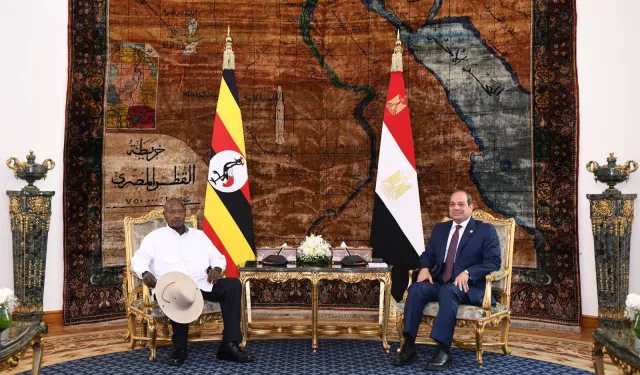Egyptian President Abdel Fattah El-Sisi has reiterated his country's firm opposition to unilateral measures in the Eastern Nile Basin, in a pointed reference to Ethiopia's policies on the Grand Ethiopian Renaissance Dam (GERD).
Speaking at a joint press conference with Ugandan President Yoweri Museveni in Cairo, El-Sisi said Egypt has sought to make the Nile “a source of cooperation, not conflict.”
“Anyone who imagines that Egypt will turn a blind eye to an existential threat to its water security is mistaken,” he said, adding, “We will take all measures guaranteed under international law to safeguard the vital resources of our people.”
El-Sisi emphasized that Egypt supports development projects in Nile Basin countries, but only as long as they do not diminish its share of the river’s waters.
To illustrate the point, he cited Ugandan President Museveni’s remarks that while the basin receives around 1,600 billion cubic meters of annual rainfall, only about 85 billion cubic meters flow into the White and Blue Niles, the portion shared by Egypt and Sudan.
“This represents just 4% or 5% of the total water in the basin,” he said. “Asking for our full share is not a rejection of development, whether for agriculture or hydropower.”
He added, “We will not give up any part of our share, because doing so would mean giving up our lives. There is no other way.”
El-Sisi further noted that Egypt faces “many pressures” and suggested water could be used as leverage for other political goals. He emphasized Egypt’s stance against interfering in others’ affairs, conspiracies, or destruction, calling instead for cooperation and stability across Africa.
“We will never allow the waters that sustain 105 million Egyptians, and around 10 million guests [referring to refugees and asylum-seekers], to be compromised,” he said.
During the conference, El-Sisi announced Egypt’s readiness to invest $100 million in the Angololo Dam project between Uganda and Kenya, and the signing of a $6 million memorandum of understanding with Uganda for integrated water resources management over five years.
Other agreements covered water management, agriculture, investment, visa exemptions for diplomatic passport holders, and diplomatic cooperation.
Egypt’s president expressed confidence in Uganda’s role in leading consultations under the Nile Basin Initiative and called for inclusivity and consensus among basin countries.
President Abdel Fattah El-Sisi underscored this position in October, describing the Nile as the lifeline for over 98% of Egypt’s population. “We are keen on pursuing the political and diplomatic path to resolve the dispute over GERD,” he said.
Last December, Egypt officially declared the end of the negotiation track. The Ministry of Water Resources and Irrigation said it would closely monitor the dam’s filling and operation, asserting Egypt’s right to defend its national and water security under international law.
